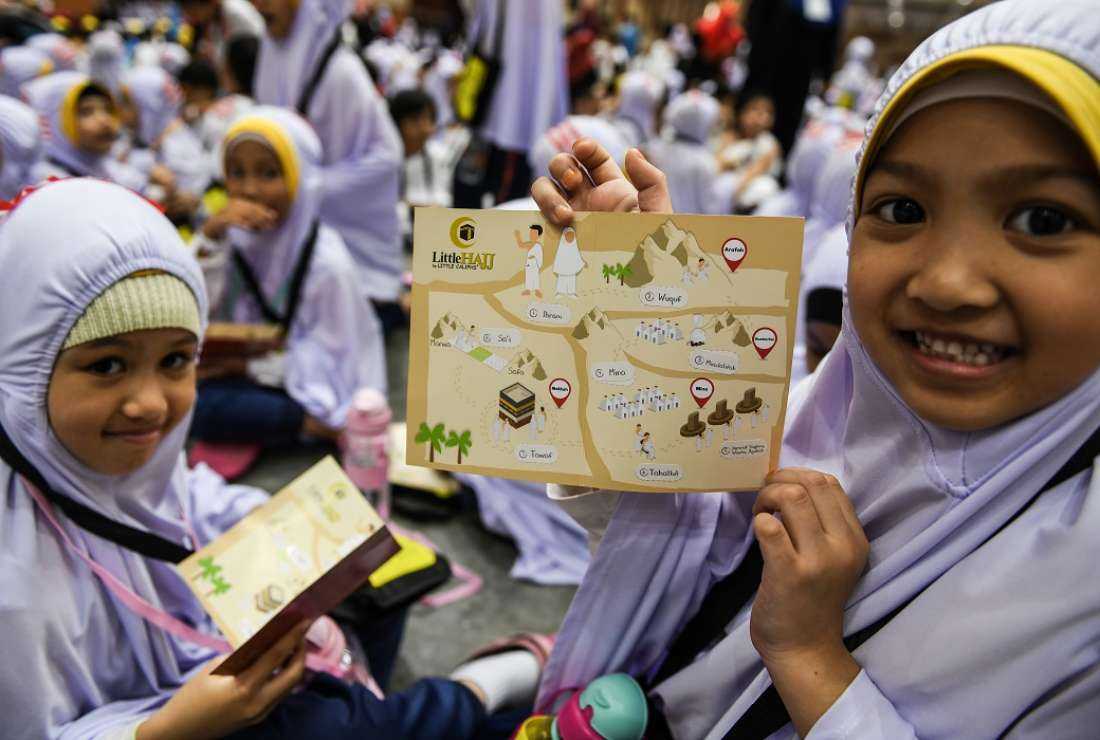
A Hijab-clad Muslim girl shows the order of religious rituals in a booklet after performing an educational simulation of the Hajj pilgrimage in Kuala Lumpur in this July 4, 2019 photo. Malaysia’s leading interfaith council has called the implementation of a module appreciating the teachings of Hadith in national schools by the Education Ministry as 'unconstitutional.' (Photo: AFP)
Malaysia’s leading interfaith council has called the implementation of a module appreciating the teachings of Hadith in national schools by the Education Ministry as “unconstitutional.”
In a statement, the Malaysian Consultative Council of Buddhism, Christianity, Hinduism, Sikhism and Taoism (MCCBCHST) said the implementation of ‘Imam Al Nawawi’s 40 Hadith’ appreciation module in national schools violates religious freedom as it espouses the complete Islamic system of life, the Malay Mail reported on Aug. 23.
Imam Al Nawawi (1230-1277) was a Syria-born cleric, jurist and Islamic scholar who authored books interpreting Hadith — Islamic theology and jurisprudence widely read and practiced in many Muslim countries.
“The ‘Hadith’ is clearly part of the Religion of Islam. There appears to be no provision in our Federal Constitution [FC] that allows such Islamic teachings in national type schools. This may be carried out in Islamic Religious Schools,” the council said.
The implementation of the 40 Hadith “could instill the fundamentals of religious understanding, in addition to instilling pure values of Islamic teachings,” MCCBCHST said.
The Federal Constitution allows every person to practice their own religion and they can’t be instructed to take part in any religious act or worship other than their own, the group said.
It also said that Article 3(1) of the constitution says, “Islam is the religion of the federation” referring only to Islamic rituals and ceremonies.
“It does not include Islam as an all-embracing concept as it is normally understood as a comprehensive system of life,” it added.
The group also noted that Article 12(2) of the constitution provides that, “Every religious group has the right to establish and maintain institutions for the education of children in its own religion.
“Thus, the 40 Hadith can be taught in Islamic religious schools but in National schools, it may be unconstitutional to do so,” it pointed out.
Additionally, Article 12(3) states that, “No person shall be required to receive instruction in or take part in any ceremony or act of worship of a religion other than his own”. Thus, the constitutional provision "protects persons including students from taking instruction in any religion other than their own,” MCCBCHST said.
The council said the government and the education minister should act according to the Federal Constitution which does not allow Islamic religion as a way of life to be introduced in national type schools.
“Malaysians were already clamoring in the past for the standard of education in schools to be improved. Instead of looking into this aspect, the ministry appears to want to embark on introducing ‘40 Hadith’ teaching into national schools, amongst others,” the council said.
“Before any further steps are taken in the matter, the Ministry of Education should consult the MCCBCHST as stakeholders in this matter. A national school must be a place where unity is promoted and not divisive policies introduced,” it said.
Malaysia is a Muslim-majority nation with an estimated population of 34 million.
Muslims account for 63.5 percent, Buddhists 18.7 percent, Christians make up 9.1 percent, Hindus 6.1 percent and some 9 percent belong to other faith groups including animists, Confucianists, Taoists, Sikhs, Bahais and Christian evangelical movements like Jehovah’s Witnesses and the Church of Jesus Christ, according to the 2020 national census.
Observers say hardline groups and Islamist political parties have been pushing for the imposition of a strong Islamic identity in recent times.
The Malaysian Islamic Party (PAS), which champions conservative Islam, has emerged as a major political force following the 2022 general election and state assembly elections in 2023.
The PAS won 43 out of a total of 222 seats in the federal parliament and is a component of the ruling Perikatan Nasional (National Alliance) coalition government. The party has elected parliamentarians or state assembly members in eight of the country's 13 states.


